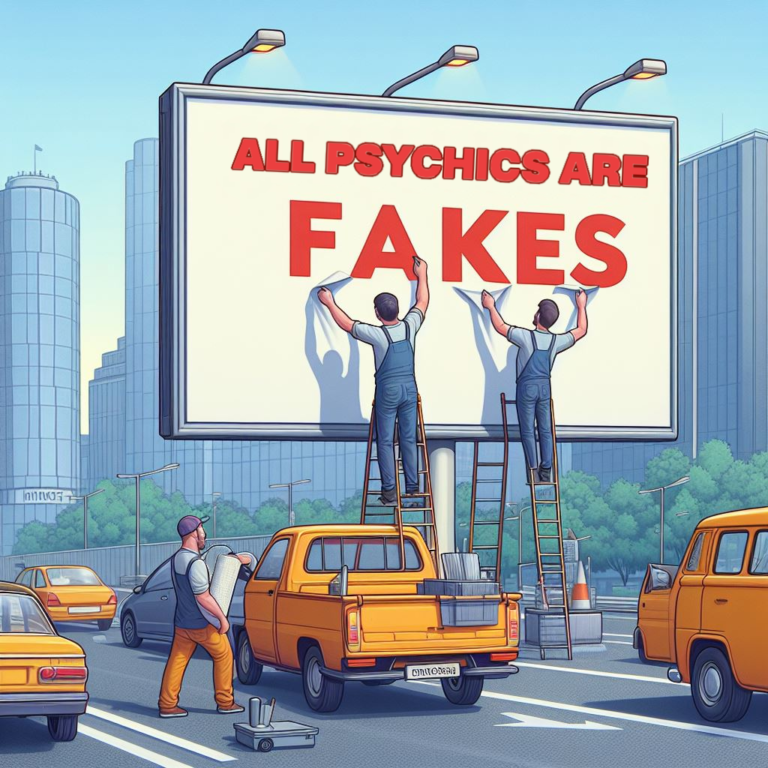If you want to survive as a psychic or medium in the outside world, you’re going to have to grow thick skin!
For as long as mystics, witches and mediums have existed, and that has been for many hundreds of years, there have been far more people prepared to condemn them as fakes, looneys and weirdos. I know from personal experience! Way back when I set out on this way of life several decades ago, a good friend of mine at that time couldn’t resist telling me and anyone around how I had lost the plot, how I was now believing that people don’t die, and how stupid I was to believe such nonsense. I became the regular and constant butt end for his jokes.
I recall how often he referred to logical people, such as Richard Dawkins, who he claimed spoke the truth. In those painful months after, I got into a state of mind that I dreaded him visiting us. I knew he would ask awkward questions that would appear like putting more fuel on the fire no matter how I tried to answer.
Part of the problem was caused because of my ignorance of the subject. I was new to this work and couldn’t deal with awkward questions, such as “You can’t prove there is life after death, whereas I can prove it doesn’t exist.“
No matter how I responded, his fixed points of view sharply silenced and belittled me. A long time before that, I’d learned that if there’s someone you don’t like and can’t get on with anymore, avoid being in their presence. That is how I dealt with my friend. I stopped seeing him so often and avoided requests to visit.
Over time, I learned how to deal with such opinions and became a smarter person, able to handle such situations with much more ease. The fact that I wasn’t giving up on my newfound interest and was proving this wasn’t a flash in the pan, so to speak, helped my confidence. I became better educated through the process and more able to handle situations that were once awkward, to say the least.
Richard Dawkins refers to mediums as “Enemies of Reason.” Indeed, many apparently intelligent commentators view us that way. Even though people have successfully communicated with the afterlife for hundreds of years, the general public opinion hasn’t changed. I have a few thoughts as to why this is so.
Recently, we needed some new fence panels and posts erected in our garden, so we put the word out in a local Facebook group asking for recommendations. We picked two of those to come and give us a price. The first person was cheap and cheerful and suggested a reasonable price for the job. When asked how he would want to be paid, he replied, “Cash is king!”. The second tradesman took his time measuring and working the job out. It took several days to receive his quote, which was almost double the first tradesman’s quote.
Guess who we chose to do the job? We went with the first person, believing he had more experience based on his ability to quote cost prices on the spot. I’ll come back to this tradesman a little later.
As in every trade and craft, mediumship has varying degrees of abilities from those that do it. People often speak well of the good ones, while others shout loudly of the bad ones. The negative voice is heard more clearly because it aligns with the general opinion that dead people are dead people.
Mediums are easy targets for the media, often because of negative feedback or the way they present themselves. Social media is full of ‘international mediums’ or ‘mediums of the stars’ types. Mediums that claim to be able to read the future, or claim to be communicating with angels, higher sources of intelligence or even our souls. These are the mediums that are doing damage to the art of mediumship.
Gordon Higginson was probably one of the finest mediums of his time. His abilities extended into his trance work. One time, a newspaper reporter was invited to attend one of his seances at Stanstead Hall. Before the evening of the seance, the reporter decided to enter the seance room, which had been prepared for the evening. He wanted to check the room for hidden props, tricks and the like.
A few days after the seance, he reported in the newspaper he worked for how he had searched the seance room. He claimed to have found a bundle of muslin taped below a chair seat near to the cabinet. He claimed that this was the material Gordon used to fool people in the room that spirits were coming in. He suggested that Gordon used this muslin in the room’s poor lighting to impersonate a spirit person. Gordon’s reputation took a battering.
It was some months later before that reporter revealed he had made the entire story up. But how many people heard his confession? The damage was already done. This is the sort of nonsense that mediumship faces every day: the non-believers who have a fixed view of all mediums as fakes. This aligns better with the general public’s doubts and scepticism.
Other well-known mediums that work in the media arena get targeted too. Derek Acorah, Colin Fry, John Edward, James Van Praagh, Sally Morgan and many more have found their reputations being questioned and mocked.
Nobody ever hears of the times when our late Queen and the Queen Mother held seances at the palace. Queen Victoria held several seances in the hope of hearing from her later husband, Prince Albert. And she did. In one seance, Albert appeared in the room and spoke to Victoria. She touched him and said he was as real as he was here. Winston Churchill, one of our finest prime ministers, often sat in seances and was a strong believer. But it was suggested that making this public might somehow damage his reputation.
The general consensus appears to be, if it’s hard to believe, don’t. Instead, make fun of it all, mock the mediums and stick by the principle that when we die, that’s the end of it.
It’s not just the public that needs educating on the subject, though. The mediums should do more to increase their understanding of the role. Instead of trying to defend their beliefs every time, they should use more powerful means, such as remaining silent or, better still, only answering questions about mediumship armed with the correct information and evidence.
A common question a medium might ask someone is, “Do you believe in life after death?” But what happens when the answer received is no? The medium appears to have hit a dead-end. Now would be a good time to rephrase the question to the person. “Would you like to believe in life after death?” This time, the answer no tells the medium the person isn’t interested in the subject rather than knowing the truth.
A mentor once said to me, “A man convinced against his will is of the same opinion still.“
We can’t convince those people with closed minds, so don’t try. Continue to be as good a medium as possible and stop worrying about what others think.
We could also help by being more honest. How many mediums are all too happy to reel off story after story about their successful readings? If you’ve explored this website, you might be led to think I’m an amazing medium, with all the success stories I’ve documented from my mediumship. But I don’t believe I am.
Mediums have a knack for using, as Richard Dawkins calls it, a one-way filter that allows only the good readings to be discussed. The problem with doing this is the medium is inadvertently setting the bar too high for their next reading. Be honest with your mediumship. When someone comes to me for a reading, I make no promises. I tell them from the off that this might not work. I only take a fee at the end of a reading, sometimes not at all.
I’ll end this article with a story about the tradesman who came to do our fence panels. He arrived on the planned day with his father to help him. Both of them worked hard, breaking up old concrete posts and setting new ones in place. I worked in my office during this time and could see them working through my window. I decided to go and introduce myself to them.
After a few minutes of me praising their work, the main man stopped, looked at me and asked what I did in my office.
I replied, “I write and create online content about my subject.”
“What’s your subject then?” came the response.
“I’m a psychic medium,” I replied confidently. It’s often easier to say psychic rather than spiritual or evidential.
Without missing a heartbeat, the fencer turned to his dad, who was still working on the fence, and said, “Hey, Dad, he’s a bullshipper.”
I changed the spelling of the actual word, but I’m sure you get the drift! He said it a few more times whilst laughing aloud. I didn’t respond. Shortly after, I returned to my office. Several hours later, when our paths crossed again, he seemed to have great pleasure in repeating his remark. “Hey dad, bullshipper’s here!”
There have been times in the past when I would have been deeply upset by his remarks. I didn’t know him, and I most certainly hadn’t given him reason to insult me so openly. Perhaps some might suggest I should have used alternative phrasing for what I do, such as, ” I’m retired and write about my passion.” But I’m not ashamed of what I do and am big enough to handle such comments.
His reaction to what I do is typical of many others’ views. People who don’t understand something often defend their ignorance with a verbal retort such as the one I received. Cumulatively, such negative remarks and ignorance of how mediums communicate with the other side means the path ahead is somewhat uphill. It always has been, and it probably always will be. All we can do as mediums is keep being the best we can be with our skills and accept that many people will always believe we are fake!











